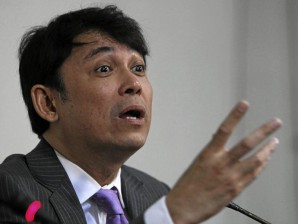Defense asks impeachment court to junk bank evidence
If Chief Justice Renato Corona’s lawyers would have their way, the Senate impeachment court should junk most of the documentary evidence formally offered by prosecutors in their bid to unseat him.
A day after the Senate ruled to admit purportedly illegally obtained records of Corona’s bank deposits, the defense counsels on Wednesday filed an objection asking the court to reject the bulk of the prosecution’s evidence, particularly those referring to his bank records and properties.
Despite the ruling, the defense panel included the disputed bank records in the objection, arguing that they were “based on documents illegally obtained through unlawful search.” They were also described as “irrelevant, immaterial and misleading.”
Defense lawyer Tranquil Salvador III said the Senate decision to admit evidence on Corona’s bank records did not exactly “weaken” the respondent’s position.
Not worried
Article continues after this advertisement“Personally, I’m not worried because I anticipated that,” he told the Inquirer. “By practice, judges admit pieces of evidence offered—unless they are blatantly inadmissible—and leave it to the other party to dispute them.”
Article continues after this advertisementIn making the ruling, the senator-judges apparently “did not want to create the impression that they were the ones who destroyed the case of the prosecution,” the counsel said.
Salvador surmised that the second article of the impeachment complaint—including the bank records—formed the “backbone” of the prosecution’s case against the Chief Justice. He said the Senate ruling only “means that we have to dispute the evidence admitted.”
Among the documentary evidence the defense objected to were certifications from Philippine Savings Bank on seven Corona accounts from 2002 to 2011.
The defense panel’s objection also focused on pieces of evidence pertaining to Corona’s statements of assets, liabilities and net worth (SALN), and land titles and other documents in connection with his properties, which were earlier revealed during the first seven weeks of trial.
Corona’s counsels noted that Article 2 charged him with “only one culpable act,” which was his alleged failure to disclose to the public his SALNs, “nothing more, nothing less.”
Ill-gotten wealth
They pointed out that the impeachment court earlier prevented the prosecution from presenting evidence in connection with alleged ill-gotten wealth, because the allegation was not formally charged in Article 2.
Still, the counsels said most of the exhibits formally offered by the prosecution on Friday were made to “prove that CJ Corona acquired ill-gotten wealth.”
The defense, for instance, opposed the admission of Corona’s SALN as of July 22, 1992, or nearly two decades before he became Chief Justice, saying it “has no reasonable connection to the issue of his supposed nondisclosure of his SALN to the public during his tenure as Justice of the Supreme Court.”
Corona’s camp sought the exclusion of the prosecution’s tender of excluded evidence, which referred to a Philippine Air Lines official’s testimony alleging that the Chief Justice had received “special benefits” from the company.
The impeachment court junked the testimony because it pertained to bribery, which was not in Article 3.
Corona’s properties
The defense asked the court to reject evidence offered by the prosecution in relation to Corona’s properties, including his family’s condominium units at The Bellagio and Bonifacio Ridge, both in Taguig City.
The condominium certificate of title (CCT) for the 303.5-square-meter Bellagio unit was allegedly “irrelevant and immaterial to the charge in Article 2.” The defense said the property, including three parking lots, “were accurately, timely and truthfully declared” in Corona’s SALN as of Dec. 31, 2010.
Corona’s camp raised the same arguments for the CCT the prosecution had marked as exhibit for the 113.02-sq. m Bonifacio Ridge unit.
In the case of the property at Lot 1, Block 16, at McKinley Hill Village, also in Taguig, the defense argued that it was “irrelevant and immaterial” to Article 2 and noted that it “is not owned” by the respondent. It was instead in the name of his daughter, Charina.
